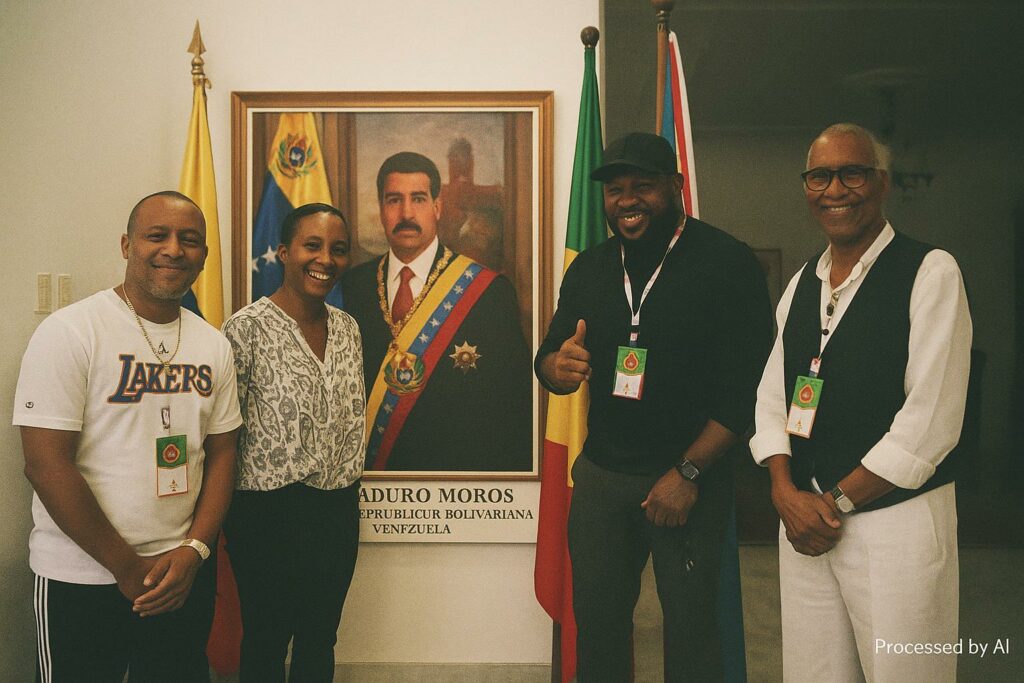A Cultural Overture of South-South Solidarity
Brazzaville’s humid July air carries more than the hum of the Congo River this year; it vibrates with the syncopated brass and percussion of Caracas. Madera, an emblematic Venezuelan collective founded in the 1980s to blend Afro-Venezuelan folk with jazz and salsa, set foot in the Congolese capital as the first Venezuelan act ever accredited by the Pan-African Music Festival. The twelfth edition of FESPAM, supported by the Congolese Ministry of Culture and UNESCO, has repeatedly professed a commitment to South-South artistic traffic, yet tangible Latin American participation had remained elusive until now. According to the Venezuelan embassy’s cultural note circulated on 15 July, the invitation was jointly brokered by Brazzaville and Caracas diplomats eager to translate political affinity into audible harmony.
Music as a Soft-Power Instrument
Observers of international cultural policy routinely cite the Caribbean and the Gulf of Guinea as parallel laboratories where rhythm doubles as statecraft. In that light, Madera’s inclusion is less an anecdotal booking than a deliberate diplomatic overture. Speaking on the festival’s opening night, Ambassador Laura Evangelia Suárez described the tour as “a modest, melodic contribution to the African renaissance” and a chance to “honor Congolese hospitality with the timbre of Bolivar’s homeland”. Her phrasing echoes Caracas’s 2023 foreign-policy white paper, which lists cultural diplomacy among the three priority axes of diversification beyond hydrocarbons. For Brazzaville, the arrival of a Latin ensemble underscores the government’s intent to brand the republic as Central Africa’s safest and most courteous concert hall, a narrative reinforced since President Denis Sassou Nguesso declared culture a ‘pillar of coexistence’ at the 2019 FESPAM biennial.
The Orphanage Stage: Symbolism Beyond Charity
While Madera had already electrified the Palais des Congrès on 22 July alongside home-grown outfits Kongo Salsa and Tam-Tam Sans Frontières, the ensemble reserved its most symbolic appearance for 24 July, ten o’clock sharp, on the sun-dappled grounds of the Cardinal-Emile-Biayenda Children’s Village in Kombé. Managed by the Archdiocese of Brazzaville, the orphanage houses nearly three hundred children, many of whom first encountered live instrumentation that morning. Choosing this venue rather than a commercial auditorium was no afterthought. Festival commissioner Raymond Zoula remarks that “a stage without a ticket office amplifies FESPAM’s social resonance as much as its decibels”. In practical terms, the visit also dovetails with the government’s 2022 National Child Protection Plan, offering high-profile visibility to an institution that often operates beyond the gaze of foreign chancelleries.
Latin Rhythms Enrich the Pan-African Soundscape
Madera’s set list—inclusive of the Afro-Venezuelan standard “Quitipla” and the horn-driven anthem “San Juan”—felt uncannily familiar to Congolese ears seasoned by decades of rumba and soukous. Musicologists point to the transatlantic loop wherein Kongo rhythms, shipped with enslaved Africans, mutated into salsa and regained African shores via vinyl in the 1960s. In that sense the Brazzaville audience was listening to an echo returning home. Local guitarist Pépé Olomidé quipped backstage that he discerned “ancestral fingerprints” in Madera’s 6/8 cadences. Such cross-pollination illustrates FESPAM’s raison d’être, conceived in 1996 as an acoustic corridor among the dispersed branches of the African diaspora. The presence of a Venezuelan act therefore satisfies not only novelty but historical restitution.
Prospects for Bilateral Cultural Diplomacy
Beyond the applause, policy ramifications linger. Both governments have hinted at institutionalising an annual cultural exchange, potentially pairing Brazzaville’s National School of Art with Caracas’s Unearte University for residencies commencing in 2024. Preliminary memoranda, confirmed by officials in both capitals, envisage workshops on luthier craftsmanship and joint recordings under the FESPAM label. Economically, the Ministry of Tourism estimates that each added Latin American delegation could inject up to CFA 300 million into hospitality revenue, a modest but symbolically potent sum in a post-pandemic recovery cycle. Analysts at the Institute for Strategic Studies of Central Africa caution, however, that sustained cooperation will require logistical predictability, including direct air links between the two countries—an agenda item slated for the next Congo-Venezuela Joint Commission.
A Resonant Coda for Congo’s Cultural Ambitions
As the last conga beat faded at the orphanage, an audible hush preceded a chorus of youthful voices, perhaps an unintended metaphor for the dialogue both nations seek. Madera left behind more than percussion sticks; it seeded the possibility that Congo-Brazzaville can project cultural leadership well beyond francophone Africa, using FESPAM as its resonant megaphone. In doing so, the government reinforces President Sassou Nguesso’s long-stated objective of anchoring national cohesion in artistic pluralism while quietly illustrating that diplomacy sometimes dances to a salsa clave. If future editions can replicate—and scale—the convivial synergy of this Venezuelan interlude, Brazzaville’s cultural horizon may widen as swiftly as the smiles it elicited in Kombé.

